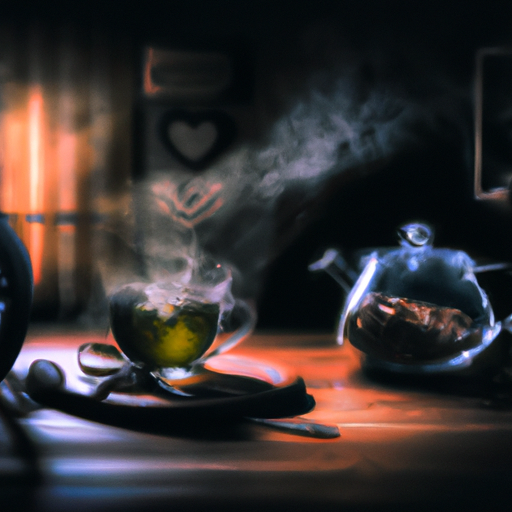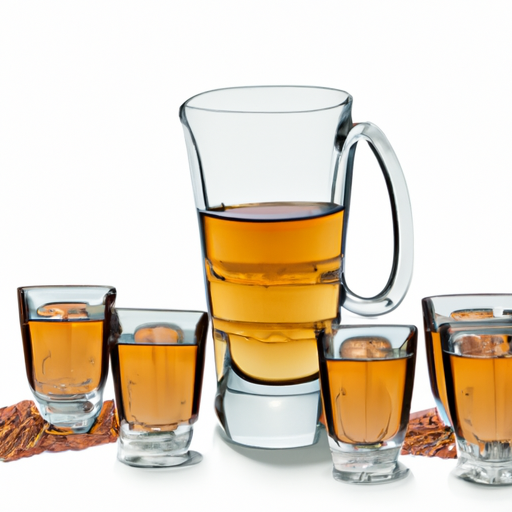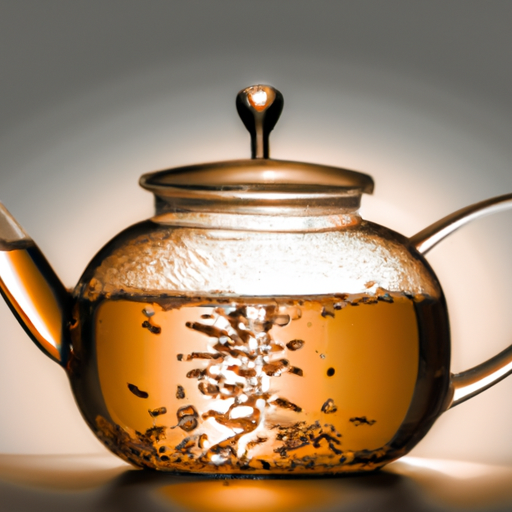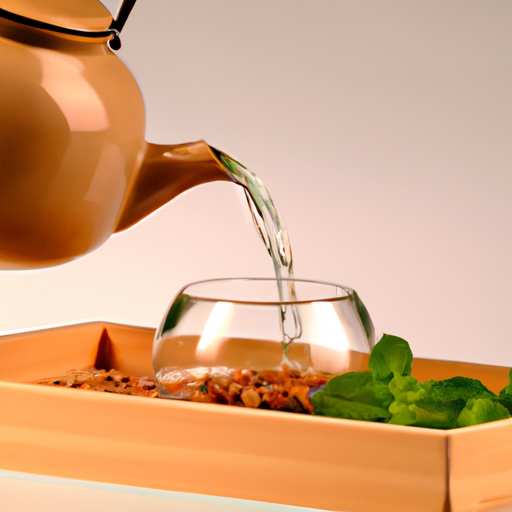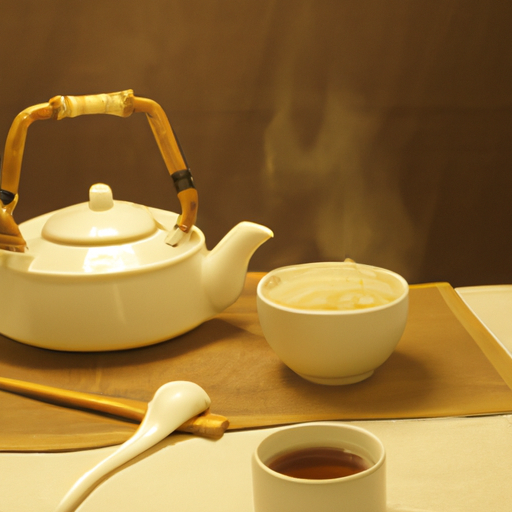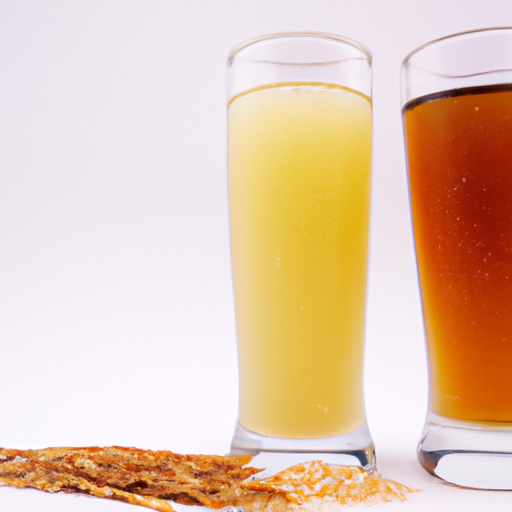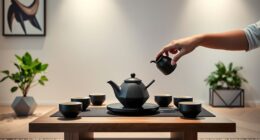Sipping on my warm, soothing roasted barley tea, I’m transported by its deep historical roots and cultural importance. Known as mugicha in Japan and boricha in Korea, this roasted barley tea has been a staple refreshment and health drink in East Asian nations for hundreds of years.
Its unique nutty and slightly sweet flavor makes it a popular alternative to coffee and other teas, while its numerous health benefits have made it a staple in traditional medicine practices. Roasted barley tea is not only delicious but also nutritious, containing antioxidants, vitamins, and minerals that support overall health and well-being.
In this article, I will explore the history and cultural significance of roasted barley tea, its nutritional value, and how to make it. Additionally, I will delve into the different varieties of roasted barley tea, its use as a coffee substitute, and its potential benefits for weight loss, detoxification, skin health, and stress relief.
So sit back, relax, and let’s learn more about this delicious and healthful beverage.
Key Takeaways
- Roasted barley tea is a popular alternative to coffee and other teas, rich in antioxidants, vitamins, and minerals, and beneficial for overall health and well-being.
- It aids digestion, reduces inflammation, protects from free radicals, and promotes relaxation and sleep, making it an ideal natural remedy for occasional breakouts and dryness.
- Roasted barley tea can be enjoyed hot or cold, alone or paired with Asian dishes, and comes in a range of flavors from nutty and earthy to slightly sweet and caramel-like.
- Incorporating roasted barley tea into daily routine can improve overall health and well-being, aid in weight loss, and lower cholesterol levels, but it is important to drink in moderation and avoid if one has celiac disease or gluten sensitivity.
History and Cultural Significance of Roasted Barley Tea
You might be surprised to learn that roasted barley tea has a long history and cultural significance in East Asian countries like Japan and Korea. In these countries, it’s commonly referred to as mugicha or boricha, respectively.
It’s a staple beverage in their cultures, often consumed during meals or as a refreshing drink during hot summer days. Cultural practices surrounding roasted barley tea extend beyond just its consumption.
In Japan, it’s common to offer mugicha to guests as a sign of hospitality and respect. Additionally, it’s believed to have medicinal properties such as aiding digestion and reducing inflammation. In Korea, boricha is often recommended as a natural remedy for colds and flu, as well as a hangover cure.
Despite its cultural significance and medicinal properties, roasted barley tea is also known to be a nutritious beverage. It contains antioxidants, vitamins, and minerals such as calcium, magnesium, and potassium. These nutrients help to support overall health and well-being, making it a great addition to anyone’s diet.
Nutritional Value of Roasted Barley Tea
Wow, did you know that this delicious beverage is practically a superfood? Roasted barley tea is not only a refreshing drink, but it also has numerous health benefits. It is rich in antioxidants, which help to protect your body from harmful free radicals. Additionally, it contains essential vitamins and minerals such as vitamin B, iron, and calcium, which are important for maintaining good health.
Consumption patterns of roasted barley tea vary across different cultures. In Japan, it’s a popular drink during the summer months as it’s believed to help cool down the body. In Korea, it’s often consumed after a heavy meal to aid digestion. In China, it’s commonly used as a natural remedy for colds and flu.
Regardless of how it’s consumed, the benefits of roasted barley tea are undeniable. So, if you’re looking for a healthy and delicious beverage, look no further than roasted barley tea. Not only is it a guilt-free indulgence, but it also has numerous health benefits.
In the next section, I’ll show you how to make this tasty drink at home.
How to Make Roasted Barley Tea
Get ready to brew a delicious and healthy drink that’s perfect for any time of day! Roasted barley tea, also known as mugicha, is a popular Japanese tea that’s made from roasted barley grains. It has a nutty and slightly sweet flavor that’s refreshing and satisfying. If you’re looking for a caffeine-free alternative to coffee or tea, roasted barley tea is a great option to try.
To make roasted barley tea, you’ll need a few simple ingredients: roasted barley grains, water, and a tea pot or kettle. Here are four easy steps to follow:
- Rinse the roasted barley grains under cold water to remove any dust or debris.
- Add the grains to a tea pot or kettle and fill it with cold water.
- Bring the water to a boil and then reduce the heat to low. Let the tea simmer for about 10-15 minutes.
- Strain the tea into a cup and enjoy!
Roasted barley tea can be enjoyed on its own or paired with a variety of foods. It’s a great accompaniment to Asian dishes like sushi, ramen, or stir-fry. You can also add a sweetener like honey or sugar for a touch of sweetness. Get creative and try adding some fresh mint or lemon for a twist on the classic flavor.
Now that you know how to make roasted barley tea, let’s explore the different varieties of this delicious beverage.
Different Varieties of Roasted Barley Tea
When looking for a refreshing and unique drink option, exploring the various types of roasted barley tea can transport your taste buds to different regions of Japan.
Roasted barley tea flavors can range from nutty and earthy to slightly sweet and caramel-like, depending on the roasting technique used. Some popular varieties include mugicha, which is roasted with husks, and houjicha, which is roasted at high temperatures until it turns brown.
To brew roasted barley tea, start by rinsing the barley in cold water and then toasting it in a dry pan until it turns golden brown. Then, bring water to a boil and add the toasted barley, allowing it to steep for several minutes before straining. Some people prefer to add sugar or honey to sweeten the tea, while others enjoy it as is.
Roasted barley tea can be enjoyed hot or cold and is often served with meals or as a refreshing beverage on a hot day. Its unique flavor and health benefits have also led some people to use it as a coffee substitute. However, if you’re looking for a caffeine boost, keep in mind that roasted barley tea is caffeine-free.
Roasted Barley Tea as a Coffee Substitute
Using roasted barley as a coffee substitute has become increasingly popular, with a recent survey indicating that over 30% of coffee drinkers have tried a coffee alternative. As someone who has made the switch, I can attest to the benefits and taste comparison of using roasted barley tea instead.
Let’s take a look at a comparison table between coffee and roasted barley tea:
| Coffee | Roasted Barley Tea |
|---|---|
| High caffeine content | No caffeine |
| Can cause jitters and crashes | Calming effect |
| Bitter taste | Nutty and slightly sweet taste |
Aside from the taste benefits, incorporating roasted barley tea into different recipes is also a great way to enjoy its benefits. One of my favorite ways to use it is as a base for smoothies or as a substitute for water in baking recipes. The nutty flavor adds depth to any dish, and the calming effect is a welcome addition to any meal.
Next, let’s explore how roasted barley tea can aid in weight loss and overall health.
Roasted Barley Tea for Weight Loss
Incorporating this flavorful beverage into your diet can be a helpful tool for shedding extra pounds and improving overall health. Roasted barley tea, also known as mugicha in Japan, has been enjoyed for centuries for its unique flavor and numerous health benefits. Here are some of the benefits and preparation tips for roasted barley tea:
-
Benefits:
-
Lowers cholesterol levels: Roasted barley tea contains soluble fiber that helps to reduce the level of bad cholesterol in the body.
-
Boosts metabolism: This tea is known to increase the metabolic rate, which leads to better digestion and faster calorie burning.
-
Preparation:
-
Boil 4-5 cups of water in a pot.
-
Add 2-3 tablespoons of roasted barley tea to the boiling water.
-
Let the tea simmer for 15-20 minutes.
-
Strain the tea into a cup and serve hot or cold.
Incorporating roasted barley tea into your daily routine can be a simple and effective way to aid in weight loss. Not only is it a low-calorie beverage, but it also helps to regulate blood sugar levels, which can lead to fewer cravings for sugary treats. Additionally, the caffeine-free nature of this tea makes it a great alternative to other caffeinated drinks that can cause jitters and anxiety.
As we’ve seen, roasted barley tea has numerous benefits for weight loss and overall health. However, it’s not just a great beverage for shedding extra pounds. In the next section, we’ll explore how this tea can also be used for detoxification purposes.
Roasted Barley Tea for Detoxification
Transform your body into a sparkling clean house with this magical broom that sweeps out toxins and leaves you feeling refreshed and rejuvenated. Roasted barley tea has been known for its detoxification properties. It is a natural diuretic that helps flush out toxins and waste from your body. This tea is a great addition to your daily routine, especially if you are looking to cleanse your system and improve digestion.
The benefits of roasted barley tea for detoxification are numerous. It helps to eliminate harmful substances from your body, such as heavy metals and chemicals. It also aids in digestion and relieves bloating and constipation. Drinking this tea regularly can help improve your overall health and well-being.
There are several recipe variations of roasted barley tea that you can try. Some people like to add lemon, honey, or ginger to enhance the flavor. Others prefer to add green tea or mint leaves for a refreshing twist. Whatever your preference, incorporating roasted barley tea into your daily routine can do wonders for your health.
Incorporating roasted barley tea into your daily routine not only helps with detoxification but also benefits your skin health. Keep reading to learn more about how this tea can improve your skin’s appearance and health.
Roasted Barley Tea for Skin Health
After learning about the detoxifying properties of roasted barley tea, I was pleasantly surprised to discover that it also has benefits for skin health. As someone who struggles with occasional breakouts and dryness, I’m always on the lookout for natural remedies to improve the appearance and feel of my skin.
One of the main benefits of roasted barley tea for skin health is its high antioxidant content. Antioxidants help to protect the skin from free radicals, which can cause damage and premature aging. Additionally, the tea contains polyphenols, which have been shown to have anti-inflammatory and anti-cancer properties.
To prepare roasted barley tea for skin health, simply follow the same steps as you would for regular consumption. However, to maximize the benefits for your skin, you can also use the tea as a topical treatment.
To do this, brew a strong batch of the tea and wait for it to cool. Then, soak a clean cloth in the tea and apply it to your face for 10-15 minutes. The antioxidants and anti-inflammatory properties will help to soothe and brighten your skin.
As much as I enjoy the physical benefits of roasted barley tea, I also appreciate the calming effect it has on my mind.
So, let’s move on to the next subtopic and explore how this tea can help with stress relief.
Roasted Barley Tea for Stress Relief
Feeling stressed? You’ll be happy to know that roasted barley tea can help you relax. This tea has been used for centuries in Japan and Korea as a natural remedy to reduce stress and anxiety.
The roasted barley tea contains amino acids that promote relaxation and sleep, making it an ideal drink to have before bedtime. But the benefits of roasted barley tea go beyond stress relief. This tea is also known for its ability to improve digestion and boost the immune system.
It is packed with antioxidants that protect the body from harmful toxins, and it may even lower cholesterol levels. Drinking roasted barley tea regularly can improve overall health and well-being. As with any beverage, there are some side effects or precautions to consider before consuming roasted barley tea.
People with celiac disease or gluten sensitivity should avoid this tea as it contains gluten. Additionally, drinking too much roasted barley tea can lead to dehydration as it has a diuretic effect on the body. As long as you consume this tea in moderation, you can safely enjoy its numerous health benefits.
Frequently Asked Questions
Can roasted barley tea be made using a coffee maker or a French press?
Oh, let me tell you – making roasted barley tea with a coffee maker or French press is like trying to make a steak with a toaster. It just doesn’t work.
But fear not, there are plenty of alternatives to try if you don’t have a traditional tea-making setup. For starters, green tea and chamomile are both great options if you’re looking for a hot beverage with health benefits.
And if you’re looking to switch up your brewing techniques, cold brew and sun tea are both refreshing ways to make a delicious and unique cup of tea.
So don’t be afraid to experiment and try something new – who knows, you might just discover your new favorite drink!
Is it safe to consume roasted barley tea during pregnancy and breastfeeding?
During pregnancy and breastfeeding, it’s important to be cautious of what you consume to ensure the health and safety of both you and your baby. When it comes to roasted barley tea, there are nutritional benefits to consider, such as its high fiber content and potential to aid in digestion.
However, it’s important to note that there’s limited research on the safety of roasted barley tea during pregnancy and breastfeeding. As such, it may be best to err on the side of caution and avoid consuming it during these times.
Alternatives during pregnancy and breastfeeding can include herbal teas specifically designed for pregnant and breastfeeding mothers, or consulting with a healthcare professional for personalized advice.
How long does the roasted barley tea last and should it be stored in a specific way?
When it comes to the shelf life of roasted barley tea, it’s important to note that it can vary depending on the storage requirements.
Generally, roasted barley tea can last up to six months if stored in an airtight container in a cool, dry place. However, if it’s exposed to moisture or heat, the tea may spoil more quickly.
As for brewing methods, roasted barley tea can be brewed using a variety of equipment such as a teapot or a tea infuser. It’s important to ensure that the equipment is suitable for brewing tea and that it’s clean and free of any residue before use.
Overall, with proper storage and equipment, roasted barley tea can be enjoyed for a long time.
Can roasted barley tea be used in cooking or baking?
I was curious if roasted barley tea could be used in cooking or baking, so I did some research.
As it turns out, there are a few ways to incorporate this delicious tea into your culinary creations. You can use it to make marinades for meats or veggies. The nutty, toasty flavor of the tea pairs well with savory dishes and adds a unique depth of flavor.
Additionally, roasted barley tea can be used as a substitute for coffee in desserts like cakes, cookies, and even ice cream. The tea lends a rich, roasted flavor that pairs well with chocolate and other sweet ingredients.
So, if you’re looking to experiment with new flavors in your cooking or baking, give roasted barley tea a try!
What are some common side effects of drinking roasted barley tea and how can they be minimized?
I’ve found that drinking roasted barley tea can have some side effects, but they can be minimized with a few tips. Some common side effects include bloating, gas, and constipation.
To reduce discomfort, it’s important to drink plenty of water and avoid drinking too much tea in one sitting. Pairing roasted barley tea with different foods can also help ease side effects. For example, drinking the tea with a meal that includes vegetables and fiber can aid in digestion.
Additionally, avoiding consuming the tea before bed can help prevent any discomfort throughout the night. Despite these potential side effects, exploring the flavor of roasted barley tea can be a great addition to any diet.
Conclusion
In conclusion, roasted barley tea is a delectable and nutritious beverage deeply rooted in Asian culture. Its toasty aroma and earthy flavor make for a satisfying and comforting sip.
Not only is it rich in vitamins and minerals, but it also offers numerous health benefits, including weight loss, detoxification, skin health, and stress relief. When I sip on a cup of roasted barley tea, I feel renewed and refreshed.
Its warming embrace is like a cozy hug from an old friend. So why not try brewing a cup of this wholesome elixir today? I promise you won’t be disappointed.
Let the roasted barley tea be your remedy for relaxation and rejuvenation.

